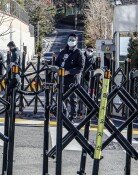Ruling party should stop legislation of toxic laws
Ruling party should stop legislation of toxic laws
Posted December. 05, 2020 07:46,
Updated December. 05, 2020 07:46
South Korean President Moon Jae-in’s approval ratings for his handling of state affairs fell below 40 percent, which is the lowest level since he took office, according to opinion polls conducted by Gallup Korea, etc. The approval ratings of the Democratic Party of Korea also recorded the lowest since the inauguration of the Moon administration. The public turning away from the current power is the result of real estate policy failures and one-sided handling of government affairs, such as dismissing Prosecutor General Yoon Seok-youl.
As the ruling party forcefully passed two laws concerning lease and rental in July amid the ongoing failure of the government’s real estate policies, the worst crisis of deposit-based lease and rental. The expelling of Prosecutor General Yoon is an unprecedented violation of the rule of law by Minister of Justice Chu Mi-ae, in which Chu ordered the exclusion of duties, disciplinary actions, and an investigation against the current prosecutor general. The public has sent a clear warning message to the ruling power for its dogmatic behavior based on their strength in number. However, the Democratic Party is forewarning another round of such behavior by planning to pass the bill concerning the Corruption Investigation Office for High-ranking Officials (CIO) and three laws on corporate regulations by December 9, the last day of the regular session of the National Assembly.
All of these bills have been criticized for potentially toxic. The law banning the dissemination of propaganda leaflets to North Korea, which was unilaterally resolved by the ruling party during the plenary session of the National Assembly’s Foreign Affairs and Unification Committee on Wednesday is under criticism for violating the Constitutional right of freedom of expression by punishing even attempted crimes.
The revision bill on the CIO, which was discussed on Friday at the bill deliberation subcommittee of the National Assembly’s Legislation and Judiciary Committee, is a change for the worse, rather than revision, such as removing the veto right of the opposition party during the nomination process of the head of the CIO. According to the revision bill, a ruling party can appoint the head of the CIO as it wishes, preventing the lively investigations of powers by the CIO and rendering the office a protective organization for the governing power. The three bills on corporate regulations – the Commercial Act, the Fair Trade Act, and the financial group control act – contain regulatory clauses found in no other country, which may propose challenges to South Korean businesses.
Meanwhile, some of the ruling party members argue that reform bills should be passed quickly to recover approval ratings as the ratings fell when the party was hesitating legislation. It is proof that shows the ruling party’s incapability to read the general public’s opinions and communicate with them. The Democratic Party can pass any bills if they desire to based on their majority. However, turning a blind eye to the warning of the public by destructing the rule of law and passing toxic laws will only advance the lame-duck period of the current administration, which has 17 months left until the end of its term.
jnghn@donga.com







